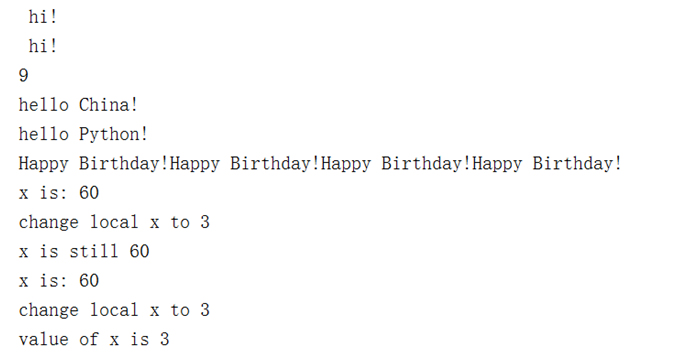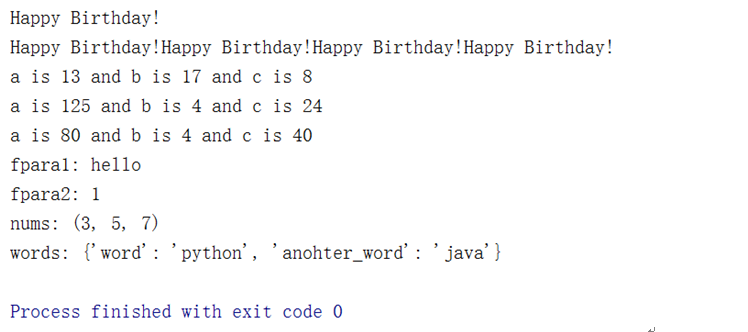1、函数定义
你可以定义一个由自己想要功能的函数,以下是简单的规则:
函数代码块以def关键词开头,后接函数标识符名称和圆括号()。
任何传入参数和自变量必须放在圆括号中间。圆括号之间可以用于定义参数。
函数的第一行语句可以选择性地使用文档字符串—用于存放函数说明。
函数内容以冒号起始,并且缩进。
Return[expression]结束函数,选择性地返回一个值给调用方。不带表达式的return相当于返回 None。
函数:程序中可重复使用的程序段。给一段程程序起一个名字,用这个名字来执行一段程序,反复使用(调用函数),用关键字 ‘def' 来定义,identifier(参数)
# -*- coding: utf-8 -*- # 没有参数和返回的函数 def say_hi(): print(" hi!") say_hi() say_hi() # 有参数,无返回值 def print_sum_two(a, b): c = a + b print(c) print_sum_two(3, 6) def hello_some(str): print("hello " + str + "!") hello_some("China") hello_some("Python") # 有参数,有返回值 def repeat_str(str, times): repeated_strs = str * times return repeated_strs repeated_strings = repeat_str("Happy Birthday!", 4) print(repeated_strings) # 全局变量与局部 变量 x = 60 def foo(x): print("x is: " + str(x)) x = 3 print("change local x to " + str(x)) foo(x) print('x is still', str(x)) x = 60 def foo(): global x print("x is: " + str(x)) x = 3 print("change local x to " + str(x)) foo() print('value of x is', str(x))
运行结果:

2、关于函数的参数,有以下三个用:默认参数,关键字参数,VarArgs参数
# -*- coding: utf-8 -*- # 默认参数: 如果没有传入参数,使用默认值 def repeat_str(s, times=1): repeated_strs = s * times return repeated_strs repeated_strings = repeat_str("Happy Birthday!") print(repeated_strings) repeated_strings_2 = repeat_str("Happy Birthday!", 4) print(repeated_strings_2) # 不能在有默认参数后面跟随没有默认参数 # f(a, b =2)合法 # f(a = 2, b)非法 # 关键字参数: 调用函数时,选择性的传入部分参数 def func(a, b=4, c=8): print('a is', a, 'and b is', b, 'and c is', c) func(13, 17) func(125, c=24) func(c=40, a=80) # VarArgs参数 #当用*在前加入一个参数名时,python将默认参数传入的是一个list或tuple,即多个参数 #当用**在前加入一个参数名时,python将默认参数传入的是一个dict,即多个有关键字指明的参数 def print_paras(fpara1, fpara2, *nums, **words): print("fpara1: " + str(fpara1)) print("fpara2: " + str(fpara2)) print("nums: " + str(nums)) print("words: " + str(words)) print_paras("hello", 1, 3, 5, 7, word="python", anohter_word="java")
运行结果:
